Living with and beyond cancer: The improvement story so far - NHS ...
Living with and beyond cancer: The improvement story so far - NHS ...
Living with and beyond cancer: The improvement story so far - NHS ...
Create successful ePaper yourself
Turn your PDF publications into a flip-book with our unique Google optimized e-Paper software.
18 | <strong>Living</strong> <strong>with</strong> <strong>and</strong> <strong>beyond</strong> <strong>cancer</strong>: <strong>The</strong> <strong>improvement</strong> <strong>story</strong> <strong>so</strong> <strong>far</strong><br />
Clatterbridge Centre for Oncology<br />
Moving forward (or initially backwards!): setting up a<br />
successful education programme for patients living <strong>with</strong><br />
<strong>and</strong> <strong>beyond</strong> pelvic <strong>cancer</strong><br />
Summary<br />
Clatterbridge Centre for Oncology has<br />
an average of 50 patients treated on<br />
each accelerator every day <strong>and</strong> over<br />
7,000 new patients registered at the<br />
hospital each year. In the delivery of<br />
services, the Trust works alongside<br />
other hospital trusts <strong>with</strong>in the<br />
Merseyside <strong>and</strong> Cheshire Cancer<br />
network, both as part of a joint multidisciplinary<br />
team approach to treatment<br />
of patients <strong>and</strong> in the provision of outpatient<br />
<strong>and</strong> day care services <strong>with</strong>in<br />
those trusts.<br />
<strong>The</strong> aim of the project was to educate<br />
patients in a ‘Moving Forward’ group to<br />
live <strong>with</strong> <strong>and</strong> <strong>beyond</strong> <strong>cancer</strong>. We<br />
completed a baseline case note audit to<br />
establish if patients who have had<br />
treatment for pelvic <strong>cancer</strong>s (colorectal,<br />
prostate <strong>and</strong> gynaecological) identify<br />
common post treatment side effects<br />
during their medical review in the late<br />
effects clinic. <strong>The</strong> aim was to establish<br />
the prevalence <strong>and</strong> management of<br />
symptoms <strong>and</strong> identify existing primary<br />
care services to which patients are<br />
referred.<br />
Patients were invited to attend the<br />
‘Moving Forward’ group <strong>and</strong> to<br />
complete a Sheffield Profile for<br />
Assessment <strong>and</strong> Referral for Care<br />
(SPARC) Holistic Needs Assessment<br />
(HNA) to ascertain whether our<br />
baseline case note data correlated <strong>with</strong><br />
patients’ identified needs. This<br />
information then formulated the<br />
content of the sessions <strong>and</strong> provided<br />
evidence of need.<br />
<strong>The</strong> problem<br />
<strong>The</strong> programme was aimed at preempting<br />
<strong>so</strong>me of the problems that<br />
patients regularly encounter living <strong>with</strong><br />
<strong>and</strong> <strong>beyond</strong> <strong>cancer</strong> which are identified<br />
at the late effects clinic. We conducted<br />
a baseline case note audit for 45<br />
patients (15 gynaecological, 15<br />
prostate, 15 colorectal) looking for<br />
documented post treatment side effects<br />
e.g. sexual health issues, bowel <strong>and</strong><br />
bladder problems, to see whether there<br />
was any documented care plan or<br />
evidence of onward referral to<br />
appropriate agencies. <strong>The</strong> audit<br />
confirmed the results from the Picker<br />
baseline survey where patients<br />
indicated that they had concerns about<br />
late effects <strong>and</strong> would have liked more<br />
information regarding these <strong>and</strong> where<br />
to access help <strong>and</strong> advice.<br />
What was done<br />
• <strong>The</strong> baseline audit set the educational<br />
agenda to address the common post<br />
treatment side effects for the first<br />
programme. 67 patients were<br />
invited, 15 phoned to confirm<br />
attendance <strong>and</strong> returned a<br />
completed SPARC before the course<br />
commenced. Some minor alterations<br />
i.e. dietetic advice were added<br />
following collation of the data from<br />
the returned SPARCs<br />
• During this first session <strong>so</strong>me<br />
signposting was done for identified<br />
level 3 needs as defined in the SPARC<br />
tool i.e. a patient that feels that in<br />
the past month they have been<br />
distressed or bothered by the<br />
problem ‘very much’<br />
• Interestingly, <strong>so</strong>me patients who<br />
declined to attend still sent back the<br />
SPARC <strong>and</strong> their identified needs<br />
mirrored those of the group<br />
participants. 67 patients invited, 21<br />
attended, six of whom turned up<br />
having not responded but brought<br />
SPARC <strong>with</strong> them, five returned<br />
completed SPARCs but couldn’t<br />
attend the sessions.<br />
What difference has this testing<br />
work identified<br />
Positives<br />
• Patient needs identified from the<br />
baseline audit <strong>and</strong> SPARC<br />
assessments showed the same types<br />
of emotional <strong>and</strong> information issues<br />
being raised<br />
• SPARC responses identified post<br />
treatment side effects e.g.<br />
psychological issues, fatigue, exercise,<br />
getting back to work<br />
• <strong>The</strong> casenote audit <strong>and</strong> completed<br />
SPARCs revealed that there were no<br />
consistent onward referrals. This has<br />
resulted in greater awareness <strong>with</strong>in<br />
the Clatterbridge team <strong>and</strong> clear<br />
onward referrals pathways <strong>and</strong><br />
robust partnership working<br />
• Effective cross boundary working <strong>and</strong><br />
sharing of expertise.<br />
Negatives<br />
• If additional needs are identified after<br />
the agenda has been set, timescales<br />
can make it difficult to access other<br />
Allied Health Professionals for their<br />
input<br />
• When SPARC is completed<br />
anonymously only general<br />
signposting for further support<br />
services could be done as part of a<br />
group session. A robust policy for the<br />
use of SPARC in this setting is<br />
essential.



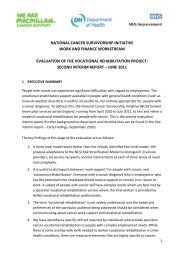
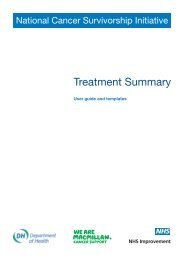
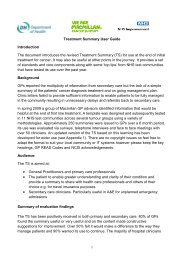
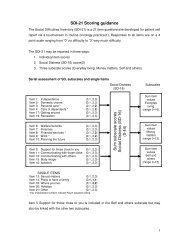
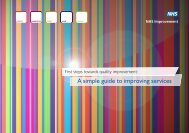
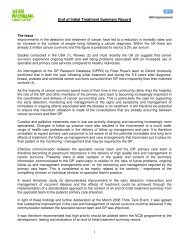
![Download the how to guide [PDF] - Macmillan Cancer Support](https://img.yumpu.com/47067428/1/184x260/download-the-how-to-guide-pdf-macmillan-cancer-support.jpg?quality=85)
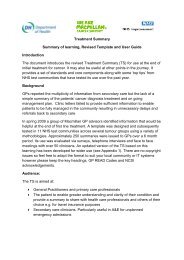

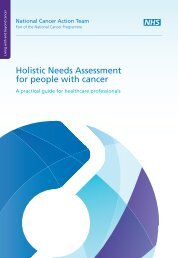
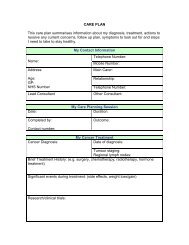

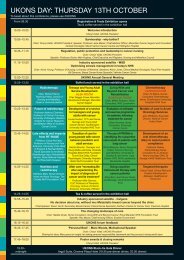
![HOPE Protocol [PDF, 420KB] - National Cancer Survivorship Initiative](https://img.yumpu.com/32566432/1/184x260/hope-protocol-pdf-420kb-national-cancer-survivorship-initiative.jpg?quality=85)